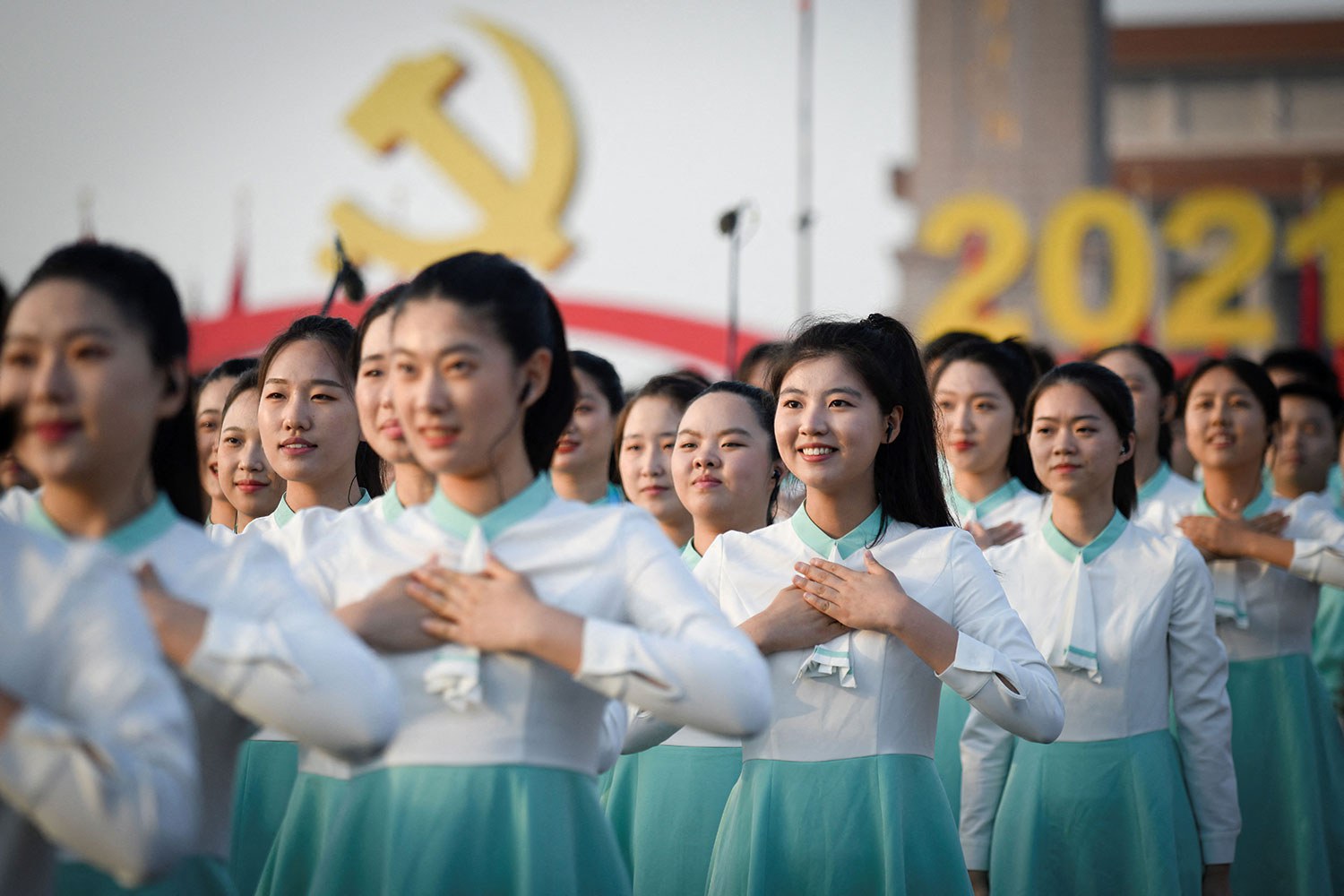In the past two months, the regime of the Chinese Communist Party (CCP) has taken drastic measures that have shocked society and have triggered widespread speculation. The state has disciplined a number of large private corporations while instituting wide-ranging regulations on the entertainment industry. The motivation behind these measures was eerily summed up by an obscure blog post that was promoted by all major state media outlets, proclaiming that “everyone can feel that a profound transformation is underway!” But is the CCP state actually leading a social transformation? Or are these measures aimed at defending the foundations of capitalism in China?
Capitalists whipped
Following the 100th anniversary of the CCP’s foundation this July, the Chinese state carried out a wave of shakedowns targeted at the private sector and spanning a range of industries. By mid-August, The Economist estimated that there had been “over 50 regulatory actions against scores of firms for a dizzying array of alleged offenses, from antitrust abuses to data violations. The threat of government bans and fines has weighed on share prices, costing investors around $1trn.”
For the most part, these measures fell upon the tech industry, which until recent times has been the jewel in the crown of the Chinese economy. In July, the state investigated ridesharing giant Didi over “cybersecurity and public interest concerns.” Shortly thereafter, the state ordered the removal of 25 apps operated by Didi from all major app stores operating in China. This came right after Didi went public in the US, and the stock prices of all major private tech firms in China were sent tumbling as fear grew of similar actions being taken against other companies.
Yet again, the brunt of the stick fell upon Jack Ma. Already in late 2020, Jack Ma’s ventures, Ant Group and Alibaba, were punished by the state with regulatory measures. This April, Alibaba was slapped with a further antitrust fine of 18.2 billion RMB ($2.8 billion USD). This month, Alibaba was explicitly ordered by the state to stop blocking the links of its rivals on its platforms. As of 13 September, the Financial Times reported of leaked plans by Beijing to break away the Alipay super-app business from Ma’s Ant Group, thus placing the former under equal ownership of Ant Group and the state-owned enterprise, Zhejiang Tourism Investment Group.
Jack Ma was forced to significantly tone down his “people’s billionaire” celebrity image, appearing in public on a few scarce occasions in low-key settings in order to avoid backlash. And yet after making just one modest public appearance at a digital farm following four months in obscurity, the state’s Central Commission for Discipline Inspection responded with a statement decrying how monopolies “disrupt fair competition” and “run contrary to the (goal of) common prosperity.” By now, Jack Ma has become the state’s favorite punch bag.
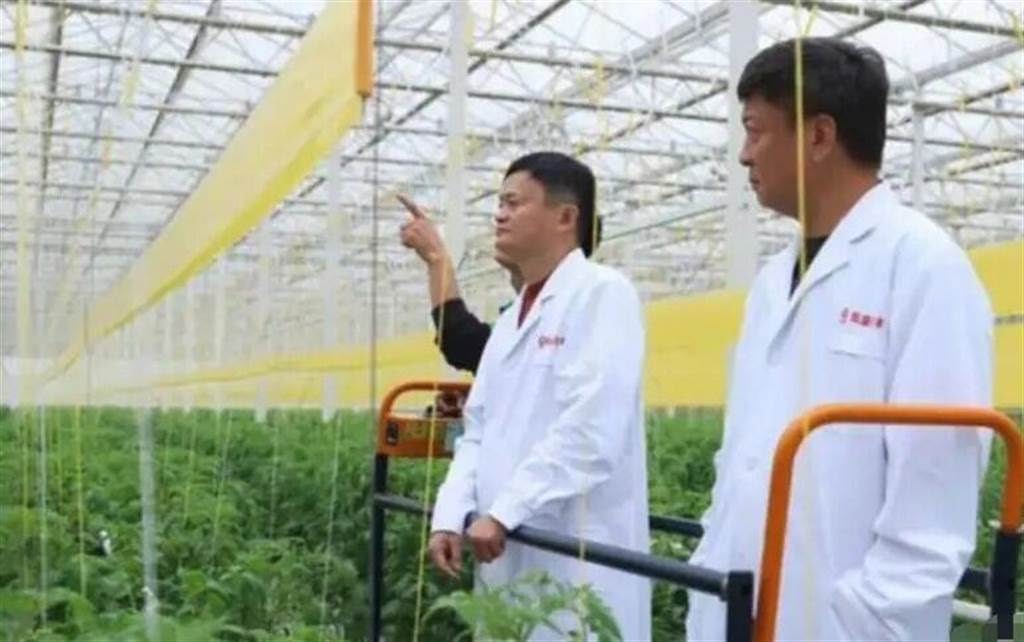 Jack Ma has by now become the state's favourite punch bag / Image: Weibo
Jack Ma has by now become the state's favourite punch bag / Image: Weibo
The CCP’s intervention into the private sector extends far beyond the tech mega-conglomerates. Another major sector being shaken up is real estate. The Evergrande group, one of the biggest real estate companies in the world, has been a primary target. On 19 July, a Chinese court froze a 132 million RMB ($20 million) deposit held by Evergrande’s main onshore subsidiary, Hengda Real Estate Group over failure to repay debts. On 19 August, the People’s Bank of China and the top regulatory agencies interviewed the heads of the Evergrande group and ordered them to immediately resolve the immense debt that the company has accumulated, which by the time of writing amounted to 57 billion RMB (around $8.9 billion USD). According to Bloomberg, Beijing was said to have instructed authorities in Guangdong to map out a plan to manage the firm’s debt problems, including coordinating with potential buyers of its assets.
Aside from tech and real estate, the food delivery giant Meituan was also recently slapped with an antitrust fine of $100 million USD, while the private tutoring industry – a $100 billion USD a year industry in China – was ordered to operate on a not-for-profit basis only, and has been forbidden from conducting summer classes.
The above measures are nothing new from the CCP. They have been introducing an increasing number of regulations to try and create market stability for the past two years. The difference now is that an increasing number of measures of this kind are being deployed on a faster and larger scale. This illustrates above all that earlier attempts to regulate the market have not prevented it from becoming unstable and in turn destabilising the whole Chinese economy. The state has therefore had to step in time and time again in an attempt to whip the maverick capitalists back into line.
Celebrities censored
Concurrent with this shake-up of the private sector in China, the state has also lashed out at China’s entertainment industry. In August, many high-profile celebrities were branded “Tainted Stars” and received punishments from heavy fines to having their works banned outright. Online entertainment sites and social networks were placed under a slew of new regulations. Fan communities are required to register with and be placed under the supervision of the celebrities’ management companies.
Ostensibly, this was an effort on the part of the state to clamp down on what they consider to be a highly materialistic and toxic culture that the entertainment industry has fostered. To be sure, fan culture or “Fanquan''(饭圈) in China is indeed a noxious place. By mobilising rabid fans to engage in contests, events, and other activities, the Fanquan-related economy is awash with fans’ cash. In 2019 the total revenue for China’s cultural and entertainment industry is estimated to be around 152 billion RMB.
The aggressive marketing on the part of the entertainment industry is geared towards baiting self-organised fan clubs into extreme activities. For example, a celebrity competition show called “Youth With You 3” introduced a mechanism for voting for the celebrity of their choice by getting fans to use tickets printed on the caps of bottles of Mengniu Dairy milk. This then led to tens of thousands of fans pooling massive amounts of cash (amounting to tens of millions of RMB within 6 hours), only to buy up tens of thousands of bottles of milk for the caps alone, and then dumping huge amounts of unused milk.
 Tens of thousands of fans pooled together massive funds only to buy up huge numbers of bottled milk caps, in the process dumping vast quantities of unused milk / Image: Wangyi
Tens of thousands of fans pooled together massive funds only to buy up huge numbers of bottled milk caps, in the process dumping vast quantities of unused milk / Image: Wangyi
If these incidents aren’t astonishing enough, there are also widespread incidents of cyberbullying, doxxing, and reporting of “enemies” to platforms or even the authorities within Fanquan culture. Should two or more celebrities become entangled in public controversies, millions of fans would tear each other apart online to defend their respective idol’s honour. It is not hard to see why the CCP’s official statement described Fanquan culture as “pandemonium” (乌烟瘴气).
While many ordinary internet users may welcome the state’s crackdown on Fanquan culture for understandable reasons, we must also consider other ways in which aspects of Chinese entertainment culture run against the state’s primary agenda, which is the stabilisation of society and above all the CCP’s rule.
Behind the antics that the Fanquan clubs organise, lies a tremendously impressive capacity for fans to self-organise. They have been able to engage in highly coordinated and centralised activities on a titanic scale. While these activities tend to be apolitical, unproductive, or even reactionary, the fact that they are outside of the grasp of the state causes the latter to perceive them as a potential threat. The CCP, which aims to deepen monitoring and control over every aspect of life in China to keep a lid on the class struggle, saw it as necessary to bring the Fanquan clubs under close supervision.
The purge of celebrities also has a political dimension. This is not to say that celebrities themselves play a progressive role in the consciousness of the masses. They certainly do not. However, the lavishness of their lifestyle and the occasional closeness some of them have with certain political adversaries of the CCP regime could inspire expressions of anger that are outside of the CCP’s control.
Singer and television actor Kris Wu, for example, was branded a “tainted artist” not only for a high-profile alleged rape scandal, but also for holding a Canadian passport. The imagery of a multi-millionaire celebrity with a foreign passport acting as he pleases has the potential of igniting massive class anger from below. Thus the state had to step in and remove Wu from the limelight before anger could crystalise.
Another case was the fall of Zhao Wei, one of the most well-known actresses in the Sinophone world. In late August, Zhao’s name and works were suddenly removed from all major video streaming platforms. There was no official explanation about this purge of Zhao. However, on the same day, state-run media outlet, Global Times, published an article recounting Zhao’s various “anti-China” scandals going back as far as 2001, along with an overview of her lavish overseas properties. It is speculated that Zhao and her husband Huang Youlong are closely tied with Jack Ma, the latter being the second-biggest shareholder of Alibaba Pictures. It may well be that Zhao is just a casualty of the CCP state lashing out at Jack Ma.
 The banning of film star Zhao Wei is possibly owed to her links with Jack Ma / Image: Mei Hotchkiss, Twitter
The banning of film star Zhao Wei is possibly owed to her links with Jack Ma / Image: Mei Hotchkiss, Twitter
China’s chaotic entertainment and celebrity culture is ultimately a product of the restoration of capitalism. Although it may seem far less “respectable” and “cultured” than other aspects of modern Chinese society, it is nevertheless a natural consequence of a deeply alienating society in which most people are turned into cogs in the process of producing profit for the bosses, rather than living as human beings. With few prospects in their own lives, fans project their hopes and dreams onto the stars on the screen in a desperate bid to feel some sort of meaning in their own lives.
One may complain about the adolescent behavior of the legions of fans, but in an era where the youth have no confidence in their future and choose to “Lie Flat” instead of buying into the false promise of prosperity through the “Chinese Dream”, they feel compelled to find other avenues to relieve the frustrations of their daily lives. The fan clubs, however misguided, at least provide a sense of community, solidarity and purpose for the youth that the so-called “socialist market” economy has robbed from them. The state may be able to crackdown on certain behavior on the part of the fans, but they cannot stop the youth from yearning for a life that is more meaningful than the one they presently have. Sooner or later, this desire will transform into political consciousness among the broader mass of Chinese youth.
A “Profound Revolution” or more of the same?
The drastic measures that the CCP has undertaken in the past two months have received a curious attempt at rationalisation in a blog post that was reposted by all major state media. This blog post, entitled, “Everyone can feel that a profound transformation is underway!” then drew widespread speculation as to whether this was in fact a manifesto of the top CCP leadership, and whether it is a sign of the latter radicalising to the left.
The blog post described the CCP’s recent measures against the private sector and entertainment industry as necessary to ensure that China does not go down the road of the Soviet Union in face of US aggression. The post also celebrates these policies as part of a “profound revolution” that:
“marks a return from ‘capitalist cliques’ to the People, a shift from ‘capital-centered’ to ‘people-centered.’ It is, therefore, a political transformation in which the People will once again be front and center, and all those who obstruct this people-centered transformation will be left behind.”
This kind of language, nostalgic of the country’s Maoist past, alarmed many capitalists, as well as the West. Chinese oppositionists overseas have speculated that the state is inaugurating what it calls a “Cultural Revolution 2.0”. The fact that a new slogan of “common prosperity” was put forward by the state in mid-August, which stresses the “incompatibility of inequality with socialism”, added to the anxiety of the capitalists.
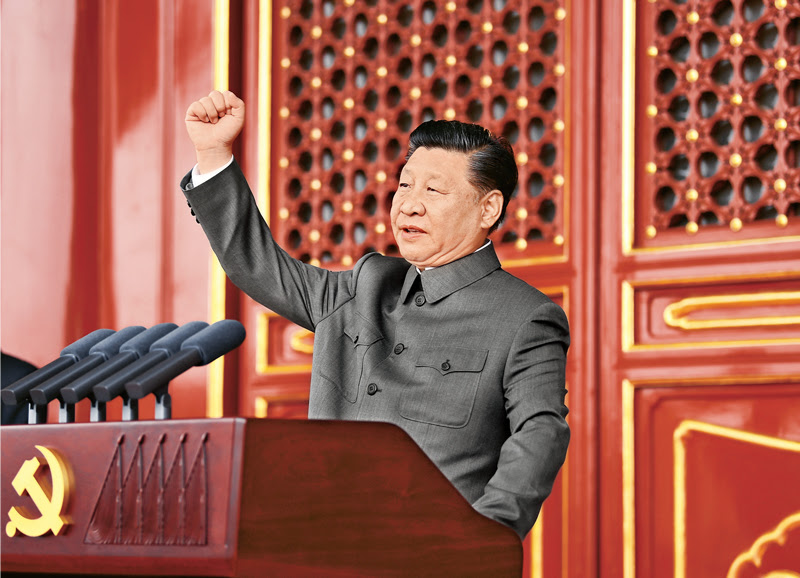 A mysterious blog post peppered with Maoist phraseology is considered to be the unofficial manifesto of the CCP’s top leadership / Image: court.gov.cn
A mysterious blog post peppered with Maoist phraseology is considered to be the unofficial manifesto of the CCP’s top leadership / Image: court.gov.cn
Nonetheless, we must ask whether a “profound revolution” is indeed underway in China. For Marxists, revolution means a complete overthrow of the political order or socio-economic system. A socialist revolution is one in which the working class overthrows the ruling capitalist class and establishes a planned and democratically-run economy, which would then spread onto the international plane.
A political revolution is obviously not underway in China as we speak, as the CCP’s dictatorship remains unchallenged. The more pertinent question many people are asking is of course an economic one: “Is China returning to a planned economy like that which existed under Mao?”
The regulatory measures that the CCP regime has deployed in recent years are indeed far more forceful than those capitalists are used to in the West. Indeed, they are unimaginable to western observers. The state was able to do this primarily due to the overall independence that the party bureaucracy enjoys from the capitalist class, as opposed to the subservience of western politicians to big capital. The West and many capitalists in China are deeply uncomfortable with this balance of forces and fear capricious measures by the bureaucracy that would hinder their profit making, or even the possibility that some capitalists could be expropriated by the regime. A worried George Soros even took to the Financial Times to warn that Xi is “putting in place an updated version of Mao Zedong’s party.”
On closer examination, however, we see that none of these regulatory measures fundamentally changes the nature of China’s economy. The state’s main aim is to regulate rather than to abolish the fundamentally anarchic market economy. They hope to use these strong rules and oversight to pull back the most maverick and destabilising capitalists in order to foster “fair competition” and a “healthy market.” Therefore, despite the massive fines, the forced corporate reorganisations, and the humiliation of individual tycoons, the economic basis upon which these mega-conglomerates developed remains completely unchanged. Indeed, they still remain the domineering players in the Chinese economy despite the various “antitrust” measures.
In the final analysis, the measures taken by the CCP are not revolutionary, but reformist ones. They hoped that by introducing more regulations, the “kinks” of monopoly, risky investments, crises and other problems that inundated western capitalist economies can be prevented through the watchful eyes of the state. They imagine that, through forceful and systematic state intervention and oversight, the contradiction between private property ownership and socialised production can be harmonised, and that the periodic crises of overproduction can be ironed out. If the party state manages to achieve this, then their dictatorship as a “Communist Party” could be justified before the masses.
As Marxists, we understand that this is a utopian illusion. The market inherently rewards “maverick” activities like risky investments, defrauding, or “irresponsible business practices” as long as there is profit to be made. No matter how many of these individuals are punished or how much regulation is produced, capitalism will continue to produce such mavericks like mushrooms from a rotting tree. But more than this, capitalism is a system predicated on the division of society into classes, in which a minority ruling class dominates and exploits the working-class majority. As long as the fundamentals of capitalism remain – i.e. private property, the anarchy of the market, and the profit motive – there can be no equality between the exploiter and the exploited. Not only that, but the very character of capitalism leads inevitably to periodic crises of overproduction. No amount of regulation can stop this from happening, and today’s China is no exception. The only way to resolve these contradictions inherent in the system is the establishment of a planned economy democratically run by a worker’s democracy. This is something that the CCP has no interest in bringing about.
These regulatory measures, therefore, are quite the opposite of a “profound revolution.” They are in fact an attempt to preserve the very same system that has existed in China for the past two decades. After the state’s promotion of the aforementioned blog post, Xi Jinping inaugurated a new stock exchange in Beijing, while the CCP’s economic tsar, Liu He, affirmed that the “policy in support of the private sector remains unchanged and will not change in the future.” Shortly after the slogan of “common prosperity” was introduced, the party took the time to reassure the capitalist class that common prosperity will not be achieved “by robbing the rich”.
The deployment of these regulatory measures has accelerated only because the dangers facing the Chinese capitalist economy have become magnified. The increasing pressure from the US also forces the CCP state to eliminate any domestic forces that can be used against it, especially among the powerful capitalists and self-organising, online communities. Unfortunately for Xi and the CCP, these policies are being outpaced by the crises erupting in Chinese society.
Shifting ground
The Chinese economy, despite enjoying a far better recovery from the pandemic than those of the West, is still plagued by issues that existed prior to COVID-19. Signs of an economic slowdown in the second half of 2021 rapidly surfaced. Consumption revenue and investment growth rates in August were both lower than in the same period last year.
Most importantly, a massive debt bomb is threatening to go off at the time of writing. The aforementioned real estate conglomerate, Evergrande Group, is now going through a profound crisis. On 14 September, rumors began circulating that Evergrande was about to declare bankruptcy. On the same day, a mob of investors descended upon Evergrande’s Beijing headquarters demanding their money back. On the morning of 15 September, China’s Ministry of Housing and Urban-Rural Development announced on behalf of Evergrande that the latter will not be able to fulfill its debt interest payment due on 20 September. The state is said to be planning on sending in a team of administrators to Evergrande premises to handle the situation. How this debt crisis unfolds and its concrete effects remain to be seen, but anxiety over a potential chain reaction is already apparent. Bloomberg explains that a default by Evergrande could “leave banks and investors on the hook for tens of billions of dollars.”
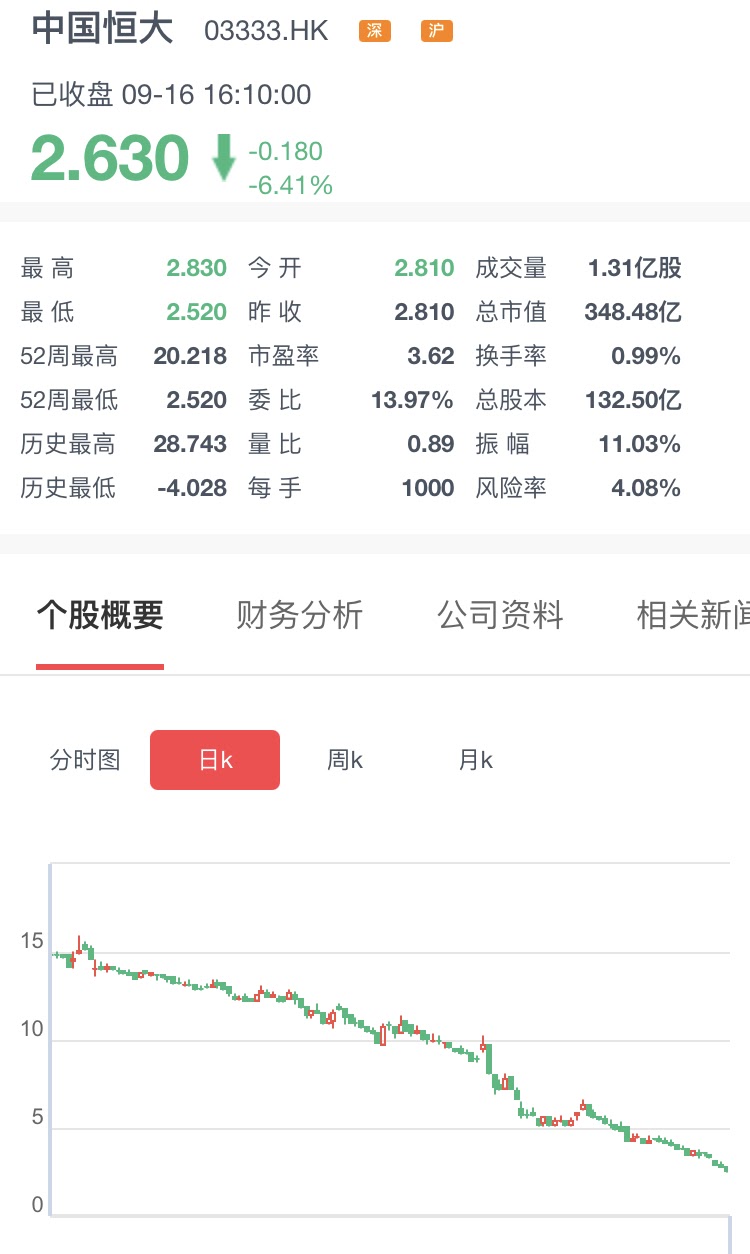 The debt crisis of Evergrande has become a major concern for many investors / Image: hstong.com
The debt crisis of Evergrande has become a major concern for many investors / Image: hstong.com
The Evergrande default crisis may have a particularly sharp impact for China, yet the spectre of chain reactions set off by debt defaults has been haunting China for some time. The public sector also faces gargantuan debt problems. Late last year, a string of State Owned Enterprises (SOEs) across many industries defaulted on debt repayments, causing a stir in the market. At the time, the state stepped in to resolve the crisis, but state intervention isn’t going to magically make bad debt disappear. It turns out that on the basis of capitalism, many of these defaults would take years to be fully settled and will continue to send ripples through the economy.
These are but a few of the more visible snapshots of the real state of China’s economy, yet it is not hard to see the entire picture: China is on the edge of a significant economic crisis, and sooner or later something is going to give. How the state will handle the larger flood tide of crises remains to be seen.
Balancing on a tightrope
Even before the capitalist class and the CCP state became on edge about the state of the economy, we were already seeing widespread discontent among Chinese society. This potential for political instability is foremost among the concerns of the CCP.
The CCP likes to take credit for the fact that China has had a comparatively better recovery than the West. While this may be true, it merely means that the existing social contradictions within Chinese society have resumed their development.
This explains the sudden emergence of a plethora of internet phenomena that all express unhappiness for the present and hopelessness for the future in one way or another. Various incidents such as the suicide of an unpaid young worker and a sexual assault cover-up by Alibaba’s top management have all inspired heated discussions online, filled with justified class anger against the system. The anger against the infamous “996” system of working hours was of such a scale that the state was compelled to act. On 27 August, the People’s Court clarified that the 996 system is actually against the law. Whether they will act upon this judicial ruling is another matter entirely.
But the state hasn’t been only offering concessions to quell this discontent. It has also responded with brutal repression. The most valiant class fighters in China are facing far harsher punishments for their activism than the mega-corporations are receiving for their business practices. In March, a delivery worker was arrested for trying to organise a strike and for forming a union outside of the official state-run trade unions. In early September, a Hong Kong University graduate studying labour conditions in Guangxi was charged with “subverting state power” and arrested.
While the threat of political instability primarily comes from below, there is another element inside the CCP that could prove to be a problem for its top leadership. As we have explained before, the bourgeoisie are a growing presence inside the ranks of the CCP. Jack Ma, a party member, is a prime example of this phenomenon. While at this stage they are far from taking hold of the party or even of being strong enough to challenge Xi Jinping, they could still consolidate their position within the bureaucracy to a degree. Recently, the city party secretary of Hangzhou, Zhejiang Province, Zhou Jiangyong was sacked and detained. Hangzhou is home to Alibaba’s headquarters, while Zhou’s family is said to be closely linked to Ma. Further, 25,000 Zhejiang Party cadres were ordered to “self-examine” improper business ties involving themselves or family members.
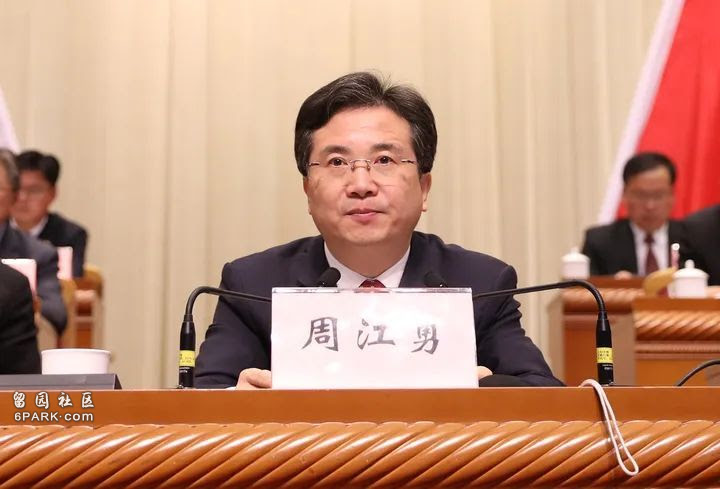 Hangzhou's city party secretary, Zhou Jiangyong, along with 25,000 Zhejiang cadres were disciplined, likely due to their deep ties with Alibaba / Image: fair use
Hangzhou's city party secretary, Zhou Jiangyong, along with 25,000 Zhejiang cadres were disciplined, likely due to their deep ties with Alibaba / Image: fair use
What this shows is that there is a potentially sizable bloc within the CCP that may be under more direct pressures from the capitalists than those at the centre. This would create yet another variable and even a threat to the Party centre as they carry out their agenda.
The CCP state will find that, just as the economic contradictions are manifesting themselves, discontent from above and below are also coming to the fore. Xi Jinping and the CCP cannot help but maintain a careful Bonapartist balancing act between the classes in China, yet they will find their balancing act will become far more complex, delicate, and difficult under the increasingly powerful economic headwinds that are being whipped up.
The recent slew of drastic measures on the part of the CCP is not a radical drive towards change, but a desperate attempt to maintain the status quo. The international media is largely worrying over whether China will be reverting back to a planned economy, but the CCP is actually moving mountains to try to stop an economic slump in China. All the while, the interests of Chinese workers and youth continue to be ignored. The only thing that the CCP can offer them at this stage is empty words about “common prosperity”.
However, no matter how strong the CCP state is, they are powerless to stop the inherent contradictions of capitalism from unwinding the social stability they strive to maintain. The unfolding debt crisis of Evergrande has the potential to be the straw that breaks the camel’s back. Marxists need to closely follow these developments and their consequences. We do not have a crystal ball to predict the exact outcome. What we can assuredly say is only this: everyone in China can feel the deep anxiety of the ruling class.

